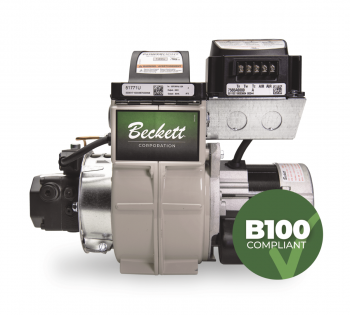R.W. Beckett Begins Production on B100 UL Certified Burners

This article was originally intended to look at the opportunities for the industry after the B100 update to the UL Standards for oil burners wasissued last year. Little did we know that as we were getting ready to go to press, R.W. Beckett would announce that they were beginning production of fully warrantied burners with B100 compliant components.
“We believe we can be the fastest carbon reduction solution for the Northeast while providing safe, reliable, and affordable heat,” said Kevin Beckett, President of R.W. Beckett. “We led the industry with the launch of the first residential B20 burners — the same models that have now become the first B100 and R100 compatible burners.”
For so many in the industry, this was the game-changer for which they had been waiting.
“The fact that R.W. Beckett was able to get burners rated for B100 into production so quickly after UL released the new standards is proof that everyone in our industry is working toward widespread use of renewable fuels, and we will do everything in our power to get there,” said Sean Cota, president of the National Energy and Fuels Institute (NEFI). “UL recognizes the value of renewables, the federal government has recognized the value of renewables, and NEFI will continue to work to ensure that every homeowner and every legislator also sees the value our members bring in the quest for a cleaner, healthier environment for all.”
Getting Here
It wasn’t so long ago that biodiesel as a heating fuel was little more than a “what-if” proposition. The ASTM D6751 standard was not adopted until 2002. Visionaries in the industry foretold of a day when this “new fuel” could be used at scale in home heating, reduce dependence on foreign oil, and lower greenhouse gas emissions.
For the last decade or so, fuel dealers have been increasing the blends of biodiesel in the Bioheat® fuel they deliver, and some state and local legislatures have included biofuel blends for space heating in their carbon reduction strategies. NEFI, NORA, Clean Fuels Alliance America and state and regional liquid fuel marketers’ associations across the country continued to promote the clear path to net-zero carbon and lower greenhouse gases. With the passage of the Providence Resolution at the 2019 Industry Summit, and the second resolution at Summit II the following year, the renewable liquid fuel industry formalized its commitment to providing a clean, net-zero carbon fuel. Today, B100 is being used in homes across the country and NORA is proving the concept with its Net-Zero Home.
In the more than two decades since ASTM D6751 was first adopted, the liquid fuel industry watched natural gas rise and then fall from grace and electricity become the new savior of the “clean energy” movement. For anyone with a modicum of knowledge, the concept of electricity as a clean energy is wrought with irony. The power plants are fueled mostly by natural gas and coal … as well as distillate fuel every time there is an extended cold snap; and the utilities themselves admit that production and infrastructure for “electrify everything” is several decades away and even longer for the volume of power needed to come from renewables.
Meet the New Standard: UL 296
The update to UL 296 included the following changes:
1.3 Oil Burners covered by this standard are intended for use with one or more of the following grades of fuel oil/biodiesel blends as defined in the Standard Specification for Fuel Oils, ASTM D396:
a) No. 1 S15, No. 1 S500, No. 1 S5000, No. 2 S15, No. 2 S500, No. 2 S5000, No. 2, which may contain up to 5% biodiesel.
b) B6-B20 S15, B6-B20 S500, B6-B20 S5000 which are biodiesel blends that may contain up to 20% biodiesel.
c) B21-B100 which are biodiesel blends that may contain up to 100% biodiesel.
d) No. 4, No. 4 (Light), No. 5 (Light), No. 5 (Heavy), No. 6.
Upon announcing the update, Michael Devine, NORA’s President, said, “This standard update is most welcome as it accelerates the liquid fuel industry’s conversion to low-carbon home heating. The ever-increasing blends of biodiesel in our fuel eliminate more and more carbon, making liquid fuel heating an essential component in addressing climate change. Amending UL 296 allows liquid fuel appliance manufacturers to provide equipment that aligns with the public policy requirements for carbon reduction.”
R.W. Beckett Produces B100 Oil Burners
On the heels of the UL 296 update, in January 2023 R.W. Beckett announced that it would begin production of oil burners with B100 compliant components with their full warranty.
In an exclusive interview with Oil & Energy Magazine, members of the Beckett team shared further insight. “Effectively, all our burners were already compatible for B100 fuels. After the introduction of the B20 standards, we took a holistic approach to ensure everything in the burner was compatible with B100, and that we were shipping burners that support our carbon reduction strategy,” explained Alan Chmiel, Beckett’s Director of Engineering.
Ian Lindsay, Director of Marketing, continued, “Several years ago, Beckett committed to a Tank-to-Flame strategy encompassing all our components and products. Our new burner controls were specifically designed from day one to perform in higher bioblend environments, including B100.”
Oil & Energy was also assured that, “as with the B20 version of our burners, we understand how imperative B100 is to the industry, and so there are no planned price increases for the new B100-rated burners,” according to Lindsay.
Burners Today, Boilers Tomorrow
Burners are the first step. The next is to have the boilers and furnaces in which to place them. Those are not far behind.
According to Roger Marran, President of Energy Kinetics, “Because we develop our boilers starting with the burner, our systems all have near-perfect burning environments. The first step in certification is to manufacture our boilers with burners certified for use with B100. With a UL certified burner, we can complete our due diligence and further confirm that our boilers operate safely and reliably with B0 through B100 fuel blends.”
Marran further explained that the company plans “to offer all residential boilers as B100 certified” to meet all Bioheat® fuel blend levels offered in the market, so that “installed equipment will be compatible and the transition to higher blends will be as affordable and seamless as possible.”
Looking at the 25C tax credits included in the Inflation Reduction Act, Marran added that they have been providing B20 rated Energy Star® systems since 2021 and already offer boilers delivering over 90 AFUE, so that as soon as the B100 burners are integrated, they will be ready to meet the more stringent requirements that will come into play in 2027.
The Energy Kinetics System 2000® is being used in the NORA Net-Zero Home with a Beckett burner, and Marran is excited about the results. “The NORA Net-Zero home is a game changer. The addition of photovoltaics in 2022 builds on two years of perfect operation with B100 fuel. It’s running with an indoor fuel tank, so cold weather is not an issue, and since solar photovoltaics were the only change needed to offset the balance of the carbon emissions, there were no technological challenges,” he said. “Electricity rates for the home are now $0.28/kWh, driving an estimated pay back of 5.74 years. I don’t know of any other technology that can cost effectively achieve this type of remarkable result in existing housing stock. Although fuel prices have been challenging in 2022, $0.28/kWh is the equivalent of over $11 per gallon of fuel oil on an energy basis, so the combination of biofuels and photovoltaics just makes good sense.”


